Peter MALONE
Saturday, 09 October 2021 13:01
Agatha Christie's Poirot Case of the Missing Will
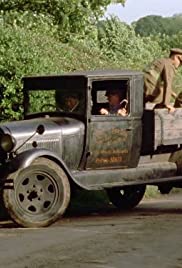
THE CASE OF THE MISSING WILL
UK, 1993, 50 minutes, Colour.
David Suchet, Hugh Fraser, Philip Jackson, Pauline Moran, Beth Goddard, Rowena Cooper, Richard Durden, Mark Kingston, Susan Tracy, Gillian Hanna, Terrence Hardiman, Edward Atterton, Neal Stuke.
Directed by John Bruce.
This is an entertaining Agatha Christie short story, one of the television series, and an opportunity to see Poirot in action, David Suchet' expert screen presence, along with Hastings, Chief Inspector Japp as well as Miss Lemon with a special mission.
The film takes up themes of equality of women with men, opening a decade after the suffragette movement, a rich man making his will but excluding a grant to his young ward. There is a transition to Cambridge in the mid 1930s, echoes of war, a debate about the place of women with the undergraduates and staff staunchly advocating the superiority of men. Poirot and Hastings have been invited to the debate.
The wealthy man had decided not to leave any grant to his ward but, in the 30s, has changed his mind and wants to change his will – but he is a murdered before that can happen.
Poirot investigates, Chief Inspector Japp is called in, there is a switch in the evidence and guilt sheeted home to the doctor who would have been granted the bulk of the estate for his research. However, it is obviously more complicated than that, especially as to who would be the heir if there was no will. There is an entertaining complication and a variety of suspects – with, eventually, a gathering everyone together, Poirot threatening possible suspects but then a revelation, certainly the least expected of the characters present as the murderer, scarcely noticed throughout the story, but with credible motivation.
1. The popularity of Agatha Christie mysteries? The television series? David Suchet as Poirot?
2. The opening in 1926? Andrew and his gathering, his will, his lawyer friend and his wife, the doctor and his research, Miss Campion? The children listening? The bequests, grants to the children, the remainder to the doctor, Violet being omitted? The children’s reaction?
3. The transition to a decade later? Poirot and his friendship with Andrew? Travelling with Hastings? The city? Late for the debate? The speeches? Andrew and the putting down of women? Robert and his defence? Violet and intervening from the gallery?
4. The issue of women, the decades after the suffragettes? Women’s rights, place in society? Miss Campion and her college within Cambridge? The separate giving of degrees to men and women? Andrew and his patriarchal attitudes?
5. Andrew, discussing his will with Poirot? His change of heart? Leaving everything to Violet? The phone call, his going to the Folly, the mysterious encounter, his death? The later finding of the container? Andrew being injected?
6. The doctor, his not getting the grant, his container being found, Chief Inspector Japp being called in, his quick conclusion, arresting the doctor at the funeral? Poirot dissatisfied, the container not there when he searched?
7. The will, disappearing? The issue of the inheritance? The lawyer, Poirot as executor of the will? The arrival of Chap?
8. Violet, young, strong-minded, the issue of the money, her love for Robert? His finishing his degree? The decision to go to America? Poirot appealing to them to stay? The graduation ceremony?
9. Andrew in Australia, the policeman and his wife, working with Andrew, their son, his benefiting from the will? The policeman upset with Poirot, his loyalties? The confrontation about the son being Andrew’s?
10. Miss Campion, staunch supporter of rights for women, relationship with Andrew, supporting Violet? Robert overhearing her with his father? In London, her being pushed down the escalator? Her surviving? The doctor’s revelation about her Caesarian birth? Poirot giving Miss Lemon a task, her investigation and the information?
11. Poirot gathering the group together, everybody present, the challenge to Robert as Andrew son? Poirot drawing back? Miss Campion and her child? The assumptions that the child was male, that Andrew’s killer was male? The truth about Violet as Miss Campion’s daughter? The revelation of the murderer – the least suspect in the group? Her motivation, wanting the money for her son?
12. A satisfying mystery – and an unexpected solution?
Published in Movie Reviews
Published in
Movie Reviews
Saturday, 09 October 2021 13:01
Vigilante, A
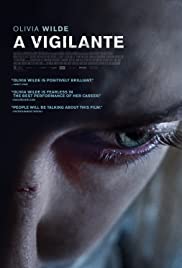
A VIGILANTE
US, 2018, 91 minutes, Colour.
Olivia Wilde, Morgan Spector.
Directed by Sarah Daggar- Nickson.
A Vigilantes is a demanding film to watch. This is a film about domestic abuse and the consequences? It doesn’t pull punches – rather lands them!
Olivia Wilde gives a powerful performance as a battered wife whose husband has been responsible for the death of their son. She has left him, joined a group of similar battered women, sharing stories. She is challenged to do something about her situation, not just retreating from the world. She finds a book, engages in martial arts training (a powerful opening sequence where she is boxing and relentlessly pounding for a long time). The audience sees her go out and challenge a respectable husband who is a wife basher, force him to make over finance for his wife, physically hurting him as he attacks, his wife ousting him from the house. She then goes to another house where the children are locked in, challenges their slatternly mother.
Only gradually is her own story revealed, her motivation for her vigilante defence of battered women.
The last part of the film shows her going in pursuit of her absent husband, tracking him down in the wilderness, his overpowering her, her getting loose, and a final confrontation where she violently destroys him, and touches of his misogynistic personality and touch of cowardice.
Vigilante films always confront the audience concerning their sympathies for victims, the exercise of violence in revenge and compensation.
1. The title? Expectations? American vigilante films? This time the central character being female?
2. The female perspective? Domestic abuse of women? Children? The portrait of abusive men? Abusive mothers? The abused wives, children? A plea against domestic abuse?
3. The city, homes, groups meeting? The wilderness, the forests, huts, abandoned buildings? The musical score?
4. The introduction to Sadie, Olivia Wilde’s performance? The boxing opening, the continuous pounding? Sadie and the make up, contact lenses, the wig? The puzzle about who she was?
5. Sadie going out on mission, and the confrontation of the man in his house, seemingly respectable, her accusations, demands, his attack, her brutal treatment of him? The wife with a broken arm? His being ousted from the house, making the financial arrangements? The gratitude of the wife?
6. The contrast with Sadie going to the home, the children locked, in squalor, the slatternly mother, her attack? Sadie protecting the children, their affectionate response?
7. The gradual explanation of Sadie’s background, her going to the group meetings? The stories told by the women – seeming authentic rather than performed? The challenge to Sadie, her initial grief, being alone, the death of her son, the drawings, the books? Her being asked to go out and do something rather than pining away?
8. The martial arts, her training, her skills?
9. In the background of her story, 10 years with her husband, her sad narration, the son, the demands, going camping, the son and his father, the son’s death? Sadie’s leaving, the father’s disappearance, the issue of insurance, his not being declared dead?
10. Sadie, going to find him, in the forest, the map and her search? His finding her, imprisoning her, binding her, his sad story, the taunts? His hunting? His philosophy of life, misogyny? Not taking the blame for their son’s death?
11. Sadie getting free, waiting with the knife, his brutal overpowering her, the axe? Her arm?
12. Her escape, through the snow, into the building, the darkness, the variety of rooms? Her husband’s pursuit? Her decision to face him? The empty pool? His declarations, saying he loved her, her going to get revenge on him? The pathos, the touch of cowardice? Sadie choking him?
13. Sadie and her lawyer, the issue of the insurance, the police finding the body, her alibi, his being a felon and the police not inclined to pursue his death?
14. Audience response to Sadie, compassion, reaction to her vigilante behaviour, the death of her husband? Her future?
Published in Movie Reviews
Published in
Movie Reviews
Saturday, 09 October 2021 13:01
Wheelman
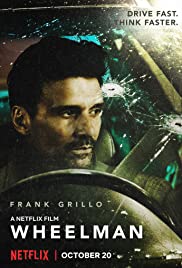
WHEELMAN
US, 2017, 82 minutes, Colour.
Frank Grillo, Caitlin Carmichael, Garrett Dillahunt, Shea Whigham, Wendy Moniz- Grillo.
Directed by Jeremy Rush.
Wheelman is something of a cinematic tour-tdeforce. Most of the action takes place in a car with much of the dialogue from phone calls. (There could be some parallels with the British film, Locke, with Tom Hardy also in a car for the duration of the film in the same kind of phone contact and dialogue.)
The premise is basic, a driver gets out of jail, is in debt, takes on a job to drive robbers to a bank, drives away, thinks he has a contract but finds there are complications with his contact, Clay (Garrett Dillahunt) and receives messages from two contacts each with contradictory messages, wanting the money.
There are complications with his 13-year-old daughter, his time with her, her being at home, as well as with his ex-wife.
The film takes place in real time, the camera in the car, angles on the driver himself, looking through the windscreen, the camera looking out the back window as the boot is opened and the stolen money counted.
Frank Grillo is Wheelman, an intense performance for an intense situation. His wife plays his ex-wife.
But the daughter and ex-wife become involved in the action, Wheelman needing to save them and shrewd enough to set up a situation where he can do that.
A first feature film, after short films and television episodes, from writer-director, Jeremy Rush.
1. Small-budget action film? Short running time? Action taking place over real-time?
2. The title, the central character, his job, his driving skills?
3. The city setting, the streets, shops, sidewalks? Banks? Parking lots? The musical score?
4. The filming within the car, the close-ups of Wheelman, the different angles, looking out the windscreen? Wheelman at the boot of the car, the camera looking through the back window? The audience in the car, with the driver, his perspective? The action sequences and the driving, the outside of the car? Other cars, pursuits, crashes? Katie and Wheelman’s home car? Her driving?
5. The situation, Wheelman’s arrival, the commission, picking up his passengers, their talk, insults, dropped the bank, the robbery seen from outside, the getaway?
6. The commission, Wheelman paying a debt after years in prison? The anonymous voices on the phone? Clay as the contact? The screenplay of phone calls? Clay and his absence, messages, return calls? The anonymous contact? The alternate anonymous contact? The orders, contradictory?
7. Wheelman ousting the two robbers? Continuing driving, the messages, picking up Clay, the arguments, the mystery, the gun, Clay shot? Wheelman leaving his body on the street?
8. The contact with Katie, her age, the boy at home with her, his leaving, Katie alone, her father’s weekend? The ex-wife? The phone calls, the growing desperation, getting Katie to drive the car to meet him at the car park? His ex-wife’s annoyance? Her being taken? The crashes, the drive-by shootings? Wheelman going to the car park, meeting Katie, getting his car, the driving, her fear? Her wanting to know what happened? Wheelman urging her to leave, her driving, but going to the exit, watching what happened? Able to pick up her father, drive him? His cropping her for her mother, the outside look at their reconciliation?
9. The issue of the money, Wheelman counting it, the thieves, the various authorities on the phone? Wheelman and his shrewdness, negotiating his wife’s release, offering the money, the blowtorch, his escape? His arrival of the rendezvous? Handing over the money?
10. The blood, had he been shot? Watching his wife and daughter together again? The film ending – was he wounded, would he die, would he live?
Published in Movie Reviews
Published in
Movie Reviews
Saturday, 09 October 2021 13:01
For the Defense
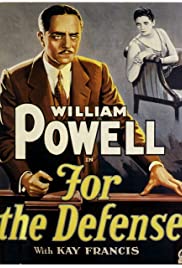
FOR THE DEFENSE
US, 1930, 65 minutes, Black and white.
William Powell, Kay Francis, Scott Kolk, William B.Davidson.
Directed by John Cromwell.
As from the title, this is clearly a film about the law. It is a very early sound film, a stirring vehicle for William Powell could began its silent films but who was to be a strong screen presence for the next 20 years and more. He was well known in the 1930s and 40s for his performances with Myrna Loy, especially in The Thin Man series.
He plays a lawyer, self-confident on the surface, suave in manner, a man about town, the bane of prosecutors and district attorney’s because of his ability to capitalise on defects of prosecution and get his clients of, especially some criminals. There are a number of court scene is to show him in action. He becomes interested in a dancer, played by Kay Francis was to be a strong screen presence during the 1930s. However, she has another suitor, a rich playboy, telling each of them that she wants to marry them.
The core of the film is about her meeting up with the playboy, his drinking, her promising to marry him, their driving, her killing someone on the road, the playboy then taking the blame to protect her. She wants to confess but there are various arguments for and against. The lawyer believes her story but, after she loses the ring he has given her and his is found in the vehicle, he mistrusts her.
However, he decides to protect her and bribes a juror who explains all to the police. Despite her pleading, he declares that he is guilty and goes to prison. She promises to wait for him when he gets out…
The film has the technical limitations of the time, photo angles, sound engineering. However, the direction is effective by John Cromwell at the beginning of a substantial career, and the acting is persuasive and effective.
Published in Movie Reviews
Published in
Movie Reviews
Saturday, 09 October 2021 13:01
Goldwyn: The Man and his Movies
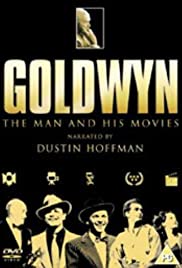
GOLDWYN: THE MAN AND HIS MOVIES
US, 2001, 118 minutes, Colour.
Narrated by Dustin Hoffman.
Directed by Mark Catalina, Peter Jones.
A commentator, focused on the power of words, was critical of a documentary by saying that it offered nothing more than what could be found in Wikipedia. While the Wikipedia articles are quick references and contain substantial information (with some limitations), the visuals of a documentary and hence the words, offer portraits of the subject, newsreel footage and background, talking heads and opinions, and, with somebody involved in cinema, clips from their films.
This is the case with this substantial biography of producer Samuel Goldwyn. It is based on a biography by A.Scott Berg, who appears throughout the film with substantial and intelligent comment.
Goldwyn is one of those Jewish émigrés from Eastern Europe who settled in the United States, became interested in early cinema, capitalised, became heads of studios and famous producers: Adolf Zukor, Carl Laemle, Louis B.Mayer, Jack Warner. And Samuel Goldwyn who was never accepted as part of the established producers.
The film gives his background, family background in Poland, his migration to the United States, his ability to make do, his involvement in glove-making and the prospect of a successful career in this industry. However, he saw some early movies and was entranced. A link with Jesse Lasky led to Cecil B De Mille, loans, the making of films, urging De Mille to move into movies. Goldwyn always remained on the outside, was antagonistic to some of the other producers, especially Mayer (and was not happy with the Goldwyn name as part of MGM).
Goldwyn was not an easy man, not always a pleasant man, difficulties in marriage, but in the 1920s, marrying a Catholic young woman, Frances, staying married to her for many decades, eventually buried beside her. The couple were caught up in his career and business, she always a charming hostess to support her husband, neglecting their son Samuel Goldwyn Jr and their daughter RuthCapps?. Both of them appear in this film, offering substantial comment about their parents, the filmmaking, their own lives. Samuel Goldwyn Jr’s wife also appears as do other friends including producer, Arthur Hornblow and his wife. Goldwyn’s secretary also offers opinions.
While there is substantial material on Goldwyn as a person, the focus is on his career, ups and downs, feeling an outsider, commercial difficulties, setting up his studios, the distribution of his films. While he made a number of silent films, he was careful not to make a huge number of films each year. This documentary shows his work with Eddie Cantor in 1930 with Whoopee. He made a number of substantial dramas during the 30s and there are scenes from Doddsworth as well as Stellar Dallas (and comments that he liked this story, something of compensation from the neglect of love from his mother).
He was nominated for an Oscar for best film several times, including for The Little Foxes (with Bette Davis a talking head in this film), for Pride of the Yankees (this film also featuring Teresa Wright as a talking head). Ultimately, working with playwright Robert Sherwood, he tapped into the post-war experience with The Best Years of Our Lives (1946).
There is some comment that Goldwyn was not always in touch with popular sensibilities, especially after the war, success with The Bishop’s Wife and, especially, the comedy is with Danny Kaye, lack of success with some RKO melodramas including Edge of Darkness. However, he produced a big budget Hans Christian Andersen as well as encouraging Marlon Brando to sing in Guys and Dolls. His last film, Oscar-awarded but not popular at the box office, was his version of the Gershwin’s Porgy and Bess.
The film traces the latter years of his life, retirement, illness, the support of his wife, his death in bed at the age of 94.
There are quite some comments about his use of language and the frequently quoted items such as a verbal contract is not worth the paper it is written on.
An interesting feature in retrospect is that while many filmmakers and actors testified at the time of the House of Un- American Activities and the anti-Communist drive, he was assertive against this attack on Civil Liberties.
Which means that this documentary, unobtrusively narrated by Dustin Hoffman, is an interesting, entertaining and overview of Hollywood, especially during the first half of the 20th century.
Published in Movie Reviews
Published in
Movie Reviews
Saturday, 09 October 2021 13:01
I Don't Feel at Home in This World Anymore
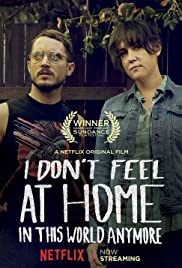
I DON'T FEEL AT HOME IN THIS WORLD ANYMORE
US, 2016, 93 minutes, Colour.
Melanie Lynskey, Elijah Wood, Gary Anthony Williams, Christine Woods, Robert Longstreet, Macon Blair.
Directed by Macon Blair.
This is something of a black comedy (with, perhaps, something of a rainbow ending) written and directed by actor, Macon Blair. Blair had written the screenplay to offbeat thriller is, with touches of horror, Blue Ruin and Green Room. This is his first film as director.
This is a tale of middle America. Melanie Lynskey plays Ruth, an ordinary woman, suffering from depression who finds that her house has been burgled, especially the taking of her computer. She has a rather annoying, sometimes intrusive neighbour, played by Elijah Wood. He volunteers to help her track down the stolen goods, especially the computer. They form a rather odd couple investigative team, he showing skills, she encouraged by the experience.
The screenplay leads them into all kinds of adventures, and quite a number of dangers, into a criminal world, into a drug world. And while Ruth might not have felt at home in this world anymore, she gets a new lease on life, a new companion, a new energy…
1. The blend of comedy and thriller? Awards?
2. The American town, houses and streets, suburbs, homes and shops? The musical score?
3. The title? Ruth’s sentiments?
4. Ruth, in herself, age, her work as a nurse, difficulties, tired, finding her house burgled, the laptop, medication, the silverware from her grandmother? The police, reprimanding her for not locking the door? Her going door to door to get information? Increasing anxiety? The police not helping?
5. Tony, the neighbour, age, eccentric, his rage, deciding to help?
6. Tracking the laptop, going to the shop, the re-sale company, the print of the shoe? The silver? The proprietor breaking Ruth’s finger? Tony knocking him out?
7. Ruth’s increased frustration, relying on Tony, remembering the number plate, the police, tracking it down? The police not helping so their impersonating police? The encounter with the wife, leading to the stepson, leading to drugs, his being imprisoned, issues of money?
8. The father, the encounter with Ruth, hitting his windpipe, and being hit by the bus?
9. The thugs, the stepson, his friends, the abduction, forcing Ruth to be part of the robbery, the bodyguard, leading to the shootout?
10. Tony, his ninja moves, being stabbed? The confrontation and the deaths? The rocks, the moccasin and the bite?
11. Ruth, her grandmother’s ghost, – and happy ending and a happy future?
Published in Movie Reviews
Published in
Movie Reviews
Saturday, 09 October 2021 13:01
Serious Game, A
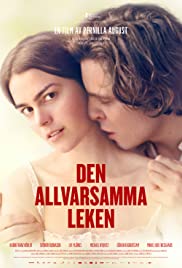
A SERIOUS GAME
Sweden, 2016, 115 minutes, Colour.
Sverrir Gudnason, Karin Franz Korlof, Liv Mjones, Michael Nyqvist, Mike' Boe Folsgaard.
Directed by Pernilla August.
The original novel on which this film is based came from 1912, written by Hjalmar Soderberg, very much in the vein of sumptuous 19th-century storytelling. It has been adapted for the screen by the director Lone Scherfig (Italian for Beginners, An Education, Their Finest) and it has been directed by actress, Pernilla August (Bergman’s Fanny and Alexander, and, in 1999, playing the title role in Mary, Mother of Jesus, as well as the mother of Annakin in The Phantom Menace).
This is a story of two people who fall in love, but live in their own worlds and ambitions, marry other people. After 10 years, and some disillusionment, they encounter one another and begin an affair – which might be fulfilling of love but also has its destructive dimensions.
1. The title? Love, relationships, infidelity? Perceiving this as a “game�?
2. Stockholm, 1901, the city settings and views, costumes and decor, the style, manner? The newspaper office, homes, the countryside in the Lake, the theatre, hotels, stations and trains? The atmosphere? The score?
3. The reference to an Ibsen play? The characters and situations resembling Ibsen?
4. Arvid, his story, ordinary, getting up, going to work, audiences liking or disliking him? His travel, clothes, the background of his father, going to study, teacher, going to the newspaper, proofreading, favoured by the editor? The trip to the Stiller family, the encounter with Lydia, the attraction, thinking about her? His being sent to the opera, his inexperience, the review? His steady life? The death of the artist, Lydia and his love for her, the prospect of a marriage, his not being able to support her? The meetings, the effect, her marrying the older man? His going to the theatre, Dagmar and her parents, the champagne? The courtship, the marriage? The years passing, his daughter, working for the paper, news, protests, reports?
5. Lydia, her ambitions, with her father, the art, wanting to get away, his death, marrying the older man, wealth, the daughter?
6. Work at the office, the character of Merkel, genial, supporting Arvid, his character, working with his staff, surprise of the older man marrying Lydia? His own hopes?
7. Linda, writer of stories, working at the paper, the past with Lydia, friendship with Arvid, Arvid using him as teaching him Russian to get away from home? Lydia is busy to him, his disillusionment, in this train, his death?
8. Arvid and Lydia meeting, the past love, its continuing despite the marriages? The beginning of the affair, the effect on each of them, the lies, Lydia and her husband, asking for the divorce, the financial support, his wanting custody, her being turned away from visit? Arvid and his lies, with his wife, declarations of love, his daughter? Yet the betrayal? The two going away on the summer holiday?
9. Arvid’s father and his death, sitting by the bedside, his father knowing the truth?
10. Arvid telling his wife the truth, the divorce, Lydia writing the letter, the wife’s reaction?
11. Arvid leaving, the burden, the encounter with Lydia and her daughter? His leaving – for what?
Published in Movie Reviews
Published in
Movie Reviews
Saturday, 09 October 2021 13:01
Resistance
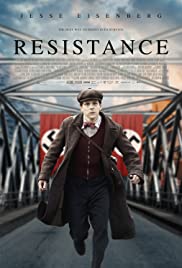
RESISTANCE
UK, France, Germany, US, 2020, 122 minutes, Colour.
Jesse Eisenberg, Clemence Poesy, Felix Moati, Vica Kerekes, Matthias Schweighofer, Geza Rohrig, Ed Harris, Bella Ramsey, Karl Markowics, Edgar Ramirez.
Directed by Jonathan Jakubowicz.
A moving story of the French Resistance – but not quite the storytelling and focus that we might have expected. Over many decades, even during World War II, there were many stories of the Resistance, especially in France. There have also been films about the rescue of orphans, getting them out of France, over the Alps, into the safety of Switzerland. And, indeed, this is the theme here.
However, this is also the story of the celebrated French mime-artist, Marcel Marceau. And he is played, unexpectedly, by Jesse Eisenberg. It would seem that those critics who have an aversion to Jesse Eisenberg do not like the film at all. Those who like Jesse Eisenberg as a screen presence, appreciate his interpretation of Marcel, and of his mining. Many, however, find his performances idiosyncratically irritating but may agree that in the mannerisms and tics are quietly controlled and that he brings Marcel Marceau sympathetically to life
The film opens on Krystallnacht, November 1938, Jewish parents assuring their daughter that all will be well, that the economy will improve and affect Hitler, but immediately, the house is attacked and the little girl witnesses the death of her parents. There is an immediate transition to Strasbourg, Alsace, on the French-German? border, a club where a young man is performing mime, and imitation of Charlie Chaplin, Hitler-moustache and all. He is Marcel Mangel, son of a Jewish butcher (Karl Markovics) who does not approve of his son’s arts ambitions. His brother Alain works for the resistance as do Emma (and engaging Clemence poesy) and her sister.
As Hitler invades Poland in 1939, the residents of Strasbourg are all moved to the south, including a number of German orphans who have crossed the border. Young locals take care of the children, Marcel able to gather them together, lift their spirits, involving them in his mime games.
The film also inserts a lot of actual footage from newsreels of the time, making Hitler’s impact and his determination to eliminate the Jews from Europe the more forceful.
The film gathers pace as the refugees travel to Lyon, in Vichy-led France, but soon the whole of the country is Nazi-occupied. Many audiences will remember the reputation of Klau Barbie, the ‘Butcher of Lyon’ and his headquarters at the Hotel Terminus. Barbie becomes a powerful presence in this film, instantly repellent as he and his men enter a gay club in Berlin and bash the members mercilessly. He is shown in Lyon, in command, encouraging collaborators to give information, cruelly taunting then shooting victims in the swimming pool of the Terminus, as the children, now being sheltered by a priest in the church, singing Ave Maria. Still on Barbie, he is also shown as welcoming his wife, his young daughter, more humanely concerned about his daughter’s future. But, nevertheless, torturing, viciously, two of the women in the group who protect the children. He is played most effectively by Mathias Schweigenhoffer.
The Resistance aspects of the film are to the fore in Lyon, eluding the occupying forces, entrusting the children to the church, out in the countryside guiding British planes dropping parachutes with men and goods. The group, always conscious that they are Jewish and a special target of Nazi hatred, is divided as to how they should resist, by armed force or, as Marcel earnestly persuades them, by getting revenge on the Nazis by saving the children who will live on rather than die.
There is some tension in the final episode in transporting the children, dressed as scouts, to the mountains for their trek, Barbie and his men patrolling the train, Marcel, quick-witted, urging the children to seeing Ave Maria, engaging in conversation about his daughter and the arts with Barbie.
However, the priest under torture indicates where the children have gone and Barbie and his men pursue them into the snow of the Alps.
Marcel Marceau, changing his name on a passport to conceal his Jewish identity, received the Legion of Honour and other awards from the French government.
The story is bracketed by a sequence where general Patton (Ed Harris) addresses the troops at Nuremberg, 1945, telling the story of Marceau – and inviting him to perform in mime for the troops, looking forward to his talented life and career.
The writer-director is from Venezuela, of Jewish- Polish descent.
(It would seem that this is a film of power and sentiment, the kind of sentiment that does not appeal to audiences who would prefer more stoicism than emotion.)
1. The title? The title? Stories from World War II? The French Resistance? Stories that began over 80 years earlier? Memories? The French Jews in the resistance? Heroism, persecution?
2. The Hebrew letter in the title? Nazi anti-Semitism? The footage with Hitler and his speeches to eliminate the Jews from Europe? The background of the concentration camps? Krystallnacht and the attack on the Jews? The Jewish orphans? The stars on the Jews coats?
3. The opening, November 1938, Elsbeth and her parents, her father reassuring her, the immediate attack on the house, her witnessing the death of her parents? Establishing the violent themes of the film?
4. The transition to Nuremberg, 1945, the Hitler arena? General Patton, speech to the troops, the story of Marcel Marceau? The return to Patton at the end of the film? The troops and their response? Welcoming Marcel Marceau onto the stage? His mime?
5. Strasbourg, 1938, Alsace, the French- German border? The scene in the cafe, Marcel and his mime, Charlie Chaplin, the Hitler moustache? The applause? At home, working in the butcher shop, his relationship with his father, his father disapproving of his performance and his ambitions, Alain and his activities, the sequence at home, his father’s chant? Later hearing his father seen in the cafe, the conversation, his father’s ambitions, his own father being a butcher and continuity?
6. The arrival of the orphans, the train on the bridge to Germany, the buses, the group welcoming them? The truck? The timidity of the orphans? Marcel and his miming, playing, enticing the children out of the truck, getting them involved, the breath and their blowing him, his responses? Alain and the others, Emma and Mila, working with the children?
7. The invasion of Poland? The inhabitants of Strasbourg moved to the south? To Limoges? To Lyon? The Vichy government? The train ride, the children getting off the train, Alain and Marcel making the distraction with the bike, getting through the guards, Emma and Mila?
8. Marcel, working with him? The attraction, Emma’s mother wanting the marriage? Emma delighted with Marcel and his mime? But not a love relationship? The contrast with Mila and Alain?
9. Life in Lyon, entrusting the children to the local priest, the Catholic garb and crosses, the choir, singing Ave Maria? The children safe in Lyon – but Nazi intentions to kill Jewish children?
10. The introduction of Klaus Barbie, his later reputation? The scene in the gay club, his entry, the distain for homosexuals, the bashing of the client? Barbie as vicious? Seeing him in Lyon? Watching the lineup of collaborators and their getting money for their information, their exemption badge? Welcoming his wife, the delight in his daughter? Those arrested, in the swimming pool of the hotel, being lined up, the background of the children singing Ave Maria? His shooting them all? The taking of Emma and Mila? The interrogation? His descriptions of torture and death? Lining them up, killing the others? The discussion with Emma? The threats? Bringing in Mila, her suffering? Emma and the exemption badge, wandering back to the group, dazed? Alain and his grief, his relationship with Mila?
11. Marcel, his passport, his name of Mangel, transforming it into Marceau?
12. The decision about the children? Scouts uniforms? Marcel and his relationship with the children, over the months, playing with them, getting their confidence? The discussion about getting them out of France all the group joining the Resistance? The scene in the forest, the plan, the parachutes, soldiers, supplies?
13. The plan to leave, Emma and the effect of the encounter with Barbie? Alain and his coming with them? The scouts’ uniforms? On the train, the man observing – and his later telling Barbie to let them go? Barbie and his men? Marcel getting them to sing Ave Maria? His discussion with Barbie, Barbie talking about singing, the arts, smiling with the prospect for his daughter, Marcel’s speech about letting her be, even forbidding and getting her to rebel? Barbie’s smile? Emma hidden in the toilet, overhearing the discussion, free?
14. Going into the Alps, the snow and the cold, the men working in the forests? The fire?
15. Barbie, the torture of the priest, his wife hearing the torture through the ventilation, asking her husband for the truth? Wanting to trust him?
16. Barbie and the men pursuing, the children climbing the tree, the previous scene in Strasbourg, training them to climb the trees and be hidden? Barbie and his torch, their climbing down, the pursuit and running, the cliff, Marcel urging them to jump? Emma being shot? At the foot of the cliff, their all surviving, except for Emma and the pathos of her death?
17. The man finding them, telling them they are in Switzerland?
18. The final information, the saving of so many Jewish children? Marcel and his awards? Barbie and his fleeing, found in South America, dying in jail?
19. Marcel Marceau and his career as an artist, as a mime?
Published in Movie Reviews
Published in
Movie Reviews
Saturday, 09 October 2021 13:01
Dans La Brume/ Hold Your Breath
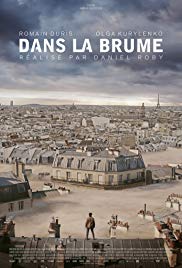
DANS LA BRUME/ HOLD YOUR BREATH
France, 2018, 89 minutes, Colour.
Romain Duris, Olga Kurylenko, Fantine Haruin, Michel Robin.
Directed by Daniel Roby.
The French title of this thriller-drama indicates the atmosphere of the plague that has threatened the world, echoes of John Carpenter and The Fog, of Stephen King and The Mist.
The action takes place in the city of Paris, the mysterious fog covering the streets and the lower floors of buildings, the central couple taking refuge in the higher floors, sharing an apartment with an elderly couple (including the veteran French actor, Michel Robin). The couple is played by Romain Duris and Olga Kurylenko. Their main concern is for their daughter, protected in a glass bubble.
The father has returned from Canada and there are hopes of some kind of remedy. However, the drama is in the present, the threats to the daughter in the bubble, the need for more oxygen, and then the need for a renewal of batteries. First the father ventures out, experiencing some of the mayhem in the streets, the threats. Then the wife has to move out for her husband, hoping for the batteries.
There is always the danger of the breaking of the glass bubble. And the possibility that some might be immune and survive – which means an apocalyptic parable, the story of a plague, destruction but a remnant living on.
1. The title? The mist? Mysterious plague? An apocalyptic story?
2. The Paris settings? The apartment block? The different apartments? The roof and the ruse of Paris? The mist, the devastation in the streets, the mist rising? The musical score?
3. The focus on the family?
4. The introduction of the family, mature, his work, at home, Anna and her love for her husband? Their daughter, Sarah, age, sealed in the hermetic glass bubble? Their coping? Mathieu, going away on business, going to Canada, the hopes for some kind of help for Sarah? Anna and her hesitations? Sara, her life in the bubble, the screens and her contact with the boys in similar circumstances? The touch of love?
5. The earthquake, the reverberations, the consequences? The mist rising in the streets? Covering the streets, covering the buildings, continually rising? Sarah safe in the bubble? Her parents having to cope, going to the upper floors, Lucien and his wife, the welcome? Working out how to survive? The concern about Sarah?
6. Ways of coping, the masks, Mathieu going out into the streets, seeing the dead bodies, the confrontation with the policeman, the mask, shooting? The bike, his injuries? The dangers of being killed? Going to Sarah, reassuring her?
7. Sarah, her fears, communication with the boys? Parents reassuring her?
8. Time, oxygen, masks, the mother going down, the changing of the batteries? The mother being caught? Death?
9. Lucien and his wife, their happy lives, marriage, the wife and forgetfulness, the decision to stay and die peacefully?
10. Mathieu, going out? The dangers? The breaking of the bubble? The irony that people would die but that those with the disease could survive and live? The scenes of Sarah running in the grass?
11. An apocalyptic parable? Destruction of the humans? A remnant surviving?
Published in Movie Reviews
Published in
Movie Reviews
Saturday, 09 October 2021 13:01
Speed Kills
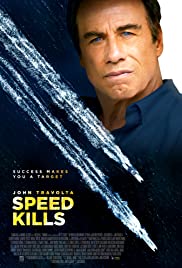
SPEED KILLS
US, 2018, 102 minutes, Colour.
John Travolta, Katheryn Winnyck, Jennifer Esposito, Michael Weston, Jordi Molla, Amaury, Nolasco, Kelan Lutz, Tom Sizemore, Matthew Modine, James Remar, Charles Gillespie.
Directed by Jodi Scurfield.
Unfortunately for the distribution of this biographical thriller, practically no one has a good word to say about it, certainly not the critics, and hostility from most of the bloggers.
The film is based on a true story, of Dan Aronow, played by John Travolta Ben Aronoff (and not flattered by reviews either). He was in Florida, is threatened by someone with gangster connections, played by Tom Sizemore, in the film moves into flashback.
Aronoff is connected with the gangster, well-known, Meyer Lansky, with a business in New Jersey. He moves to Florida, becomes involved in racing boats, building up a successful business. However, he is dominated by the mob and his business is a cover for drug distribution and dealing. He marries, has problems with his son, the action taking place over more than 20 years.
The film has a reasonably strong cast, has a lot of speeding boat races, has domestic drama, threats from gangsters, and a grim ending.
1. Based on a true story? The 1960s to the 1980s? American mob stories?
2. The opening, New Jersey, the dealership, Ben Aronoff, being called to account, his stance, driving, his being killed? The device of the flashback, for almost 30 years?
3. The action in Florida, the coast, boats, homes and mansions, clubs, dealerships, the homes of the mob members? Police and FBI precincts? On the sea? The musical score?
4. John Travolta as Ben Aronoff? Over a period of a quarter of a century? His wife, the children, his achievement in New Jersey, building shopping balls? Wealth? The transition to Florida, his desire not his wife’s? Plans?
5. The speedboats, his immediate attraction, the details, the exhilaration of driving? His collaborators, learning? His decision to build boats? His career over the years, success, his selling the boats? His participation in the races and winning? His sons accident, going to hospital, alienating his wife? The social and the encounter with Emily, his pursuing her, her falling in love with him? Marrying, the son? A new and different life?
6. Milo Lansky, audience knowledge of him and his work for the Mob? His personality, the discussions with Ben? Dealing, oats for drugs? Lansky and his going to Israel to avoid the FBI, the return to the US, his confrontation with Ben, accusing him of taking the money? Further deals for smuggling? His collapse and death? His nephew, interactions with men, Ben’s dislike of him?
7. Robbie Remo, relationship with Lansky, dealings with Ben, jealousies? Deals, violent threats, undermining him? The plan to build a rifle shipbuilding business? Ben pushing him into the water? The buildup of animosities, Robbie and his henchman?
8. The FBI agent, the discussions with Ben, friendly, Ben keeping respectable? The FBI and gathering information, ready to move to a arrests?
9. Ben, the threats, the violence, sending Emily and his son to New Jersey? The drive to the airport and the dangers, Ben intervening, the crash?
10. Ben, returning to New Jersey – and the return to the scene of the interview, the threats, his being shot?
Published in Movie Reviews
Published in
Movie Reviews